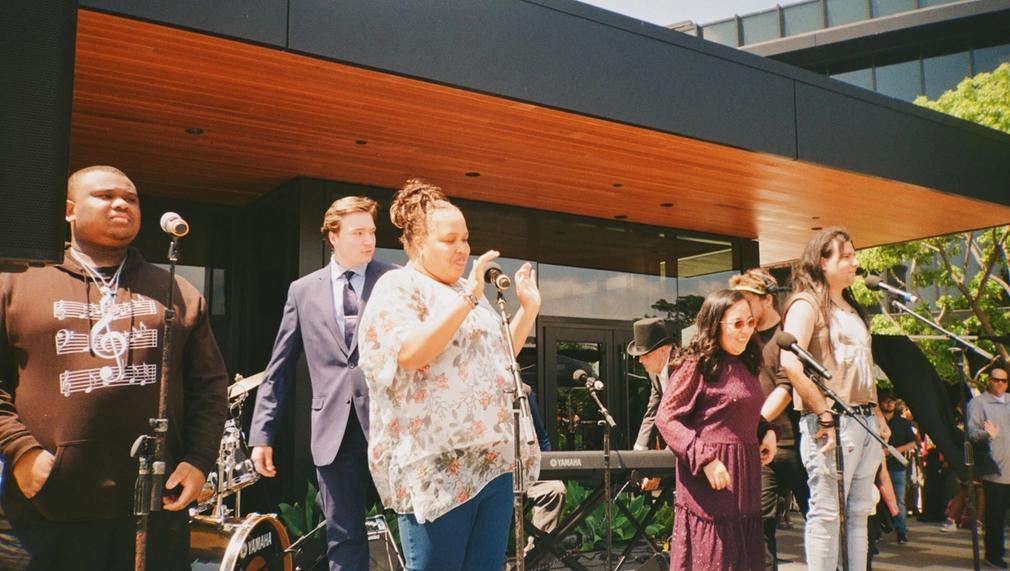Disability Inclusion in the Music Industry
JHFA uses music as a vehicle to create change and break down barriers that have historically prevented adults with Autism Spectrum Disorder (ASD) from gaining meaningful employment. This grant will help codify postsecondary curricula for ASD adults in four music-related career tracks: 1. performance, 2, composition, 3. music administration or 4. teaching/ pedagogy. To supplement this curriculum, JHFA will offer related experiential career support through placement in internships, paid employment and advocacy.

What is the primary issue area that your application will impact?
Access to Creative Industry Employment (sponsored by the Snap Foundation)
In which areas of Los Angeles will you be directly working?
County of Los Angeles
In what stage of innovation is this project, program, or initiative?
Pilot or new project, program, or initiative
What is your understanding of the issue that you are seeking to address?
Over 5.4 MILLION adults in the US have ASD. The CDC estimates CA is home to the largest proportion (701,669). Knowing LA comprises 25% of CA's population (2021 census), we estimate over 175,000 Angelenos have ASD! This population is growing. Each year, 50,000 teenagers with ASD across the nation turn 18 & age out of school-based services. Upon leaving school, there are very few services available - 1/4 receive no postsecondary services. ASD Adults struggle with social interactions, making employment difficult. That renders over 90% unemployed or underemployed! UNDER 10% of adults with ASD have a financially stable, meaningful life. Lack of employment leads to loneliness and amplified social challenges. Adults with ASD are 4x more likely to experience loneliness than neurotypical adults. As such, JHFA provides employment skills & advocacy for adults with ASD. Reflecting on how JHFA has changed their life, one student stated, "without JHFA I would feel lonely and without purpose."
Describe the project, program, or initiative this grant will support to address the issue.
JHFA has offered vocational training to the ASD community since 2014. A grant from LA2050 will enhance our model by codifying our curriculum with aligned experiential learning opportunities in four career tracks. While other vocational programs focus on menial tasks, we use music as a vehicle for change. Music therapy is well-established in K-12 ASD services as an effective therapy for ASD children. Researchers have discussed advanced music memory, responsiveness & aptitudes within the adult ASD population. However, no other org has used music as a vehicle for supporting adults with ASD in vocational training! This project will assist ASD adults with skills specific to music industry AND transferable professional & social skills. This grant will help: 1. Develop JHFA curriculum. Stage 1 addresses music-industry knowledge. Stage 2 focuses on 4 career tacks: performance, composition, music administration & teaching. JHFA will offer courses digitally through online platform Moodle in-person, digitally or hybrid. 2. Create internships. JHFA will partner with a variety of local orgs to deliver aligned internships for each career track (Melrose Trading Post, Kayne Eras Center, Music is Unity & the Cities of Pasadena & Culver City). Each musician will receive one-on-one coaching including portfolio dev & guidance with self-promotion from JHFA staff. 3. Promote a digital music library. JHFA will launch & promote the first music library of songs specifically by artists with ASD.
Describe how Los Angeles County will be different if your work is successful.
JHFA envisions a future where Angelenos with ASD gain employment & contribute to the LA community just as any neurotypical Angelenos. During the grant cycle, we intend to: help marginalized artists with ASD secure employment; train musicians with autism to master soft skills such as professional development, conflict management and networking; & instill confidence in social skills, communication & in their artistic abilities by providing a holistic intervention solution. In the long term, Founder, Neweke says, "JHFA is creating a pipeline of neurodivergent talent that can fill roles in the Los Angeles County entertainment industry workforce as companies seek to hire more neurodivergent talent." This grant will transform the music industry in Los Angeles by creating career opportunities for artists with disabilities, promoting inclusion in the music industry, fostering relationships between adults with ASD & neurotypical individuals & changing the way adults with ASD are taught.
What evidence do you have that this project, program, or initiative is or will be successful, and how will you define and measure success?
We know JHFA effectively promotes music industry career opportunities for adults with ASD. To date, JHFA has helped over 200 musicians with ASD complete over 180+ gigs, 75% of which were paid. Between 2021 & 2022, there was a 21% increase in the number of gig/work opportunities for our musicians & a 125% increase in earnings! Building on these successes, JHFA will track progress of goals (no.8) & key metrics using a combination of pre/post tests (auditions, recitals), teacher surveys (monthly reports & report card submitted every trimester), self-reported outcomes, audience reports & employer surveys. JHFA employs a FT Ops Director & PT Analyst tasked with tracking key metrics & evaluating/improving the program. This program fundamentally improves the life experiences of adults with ASD living in LA. One student commented, "JHFA has enriched my life for the better because it has given me more opportunities to express myself through my music & opened doors for me to meet new people."
Approximately how many people will be impacted by this project, program, or initiative?
Direct Impact: 30
Indirect Impact: 70